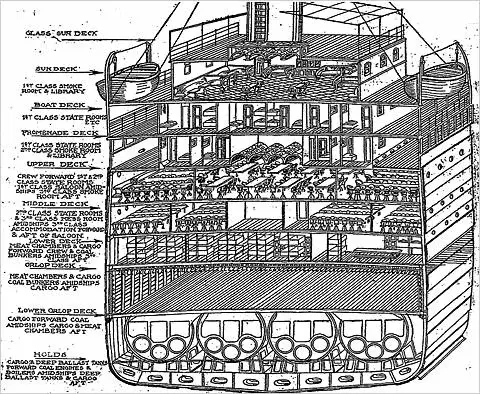CHAPTER III
The Collision and Embarkation in Lifeboats
I had been fortunate enough to secure a two-berth cabin to myself,—D 56,—quite close to the saloon and most convenient in every way for getting about the ship; and on a big ship like the Titanic it was quite a consideration to be on D deck, only three decks below the top or boat-deck. Below D again were cabins on E and F decks, and to walk from a cabin on F up to the top deck, climbing five flights of stairs on the way, was certainly a considerable task for those not able to take much exercise. The Titanic management has been criticised, among other things, for supplying the boat with lifts: it has been said they were an expensive luxury and the room they took up might have been utilized in some way for more life-saving appliances. Whatever else may have been superfluous, lifts certainly were not: old ladies, for example, in cabins on F deck, would hardly have got to the top deck during the whole voyage had they not been able to ring for the lift-boy. Perhaps nothing gave one a greater impression of the size of the ship than to take the lift from the top and drop slowly down past the different floors, discharging and taking in passengers just as in a large hotel. I wonder where the lift-boy was that night. I would have been glad to find him in our boat, or on the Carpathia when we took count of the saved. He was quite young,—not more than sixteen, I think,—a bright-eyed, handsome boy, with a love for the sea and the games on deck and the view over the ocean—and he did not get any of them. One day, as he put me out of his lift and saw through the vestibule windows a game of deck quoits in progress, he said, in a wistful tone, “My! I wish I could go out there sometimes!” I wished he could, too, and made a jesting offer to take charge of his lift for an hour while he went out to watch the game; but he smilingly shook his head and dropped down in answer to an imperative ring from below. I think he was not on duty with his lift after the collision, but if he were, he would smile at his passengers all the time as he took them up to the boats waiting to leave the sinking ship.
After undressing and climbing into the top berth, I read from about quarter-past eleven to the time we struck, about quarter to twelve. During this time I noticed particularly the increased vibration of the ship, and I assumed that we were going at a higher speed than at any other time since we sailed from Queenstown. Now I am aware that this is an important point, and bears strongly on the question of responsibility for the effects of the collision; but the impression of increased vibration is fixed in my memory so strongly that it seems important to record it. Two things led me to this conclusion—first, that as I sat on the sofa undressing, with bare feet on the floor, the jar of the vibration came up from the engines below very noticeably; and second, that as I sat up in the berth reading, the spring mattress supporting me was vibrating more rapidly than usual: this cradle-like motion was always noticeable as one lay in bed, but that night there was certainly a marked increase in the motion. Referring to the plan, [1] See Figure 2, page 116.
it will be seen that the vibration must have come almost directly up from below, when it is mentioned that the saloon was immediately above the engines as shown in the plan, and my cabin next to the saloon. From these two data, on the assumption that greater vibration is an indication of higher speed,—and I suppose it must be,—then I am sure we were going faster that night at the time we struck the iceberg than we had done before, i.e., during the hours I was awake and able to take note of anything.

FIG 4. TRANSVERSE VIEW OF THE DECKS THE TITANIC
S Sun deck
A Upper promenade deck
B Promenade deck, glass enclosed
C Upper deck
D Saloon deck
E Main deck
F Middle deck
G Lower deck: cargo, coal bunkers, boilers, engines
(a) Welin davits with lifeboats
(b) Bilge
(c) Double bottom
And then, as I read in the quietness of the night, broken only by the muffled sound that came to me through the ventilators of stewards talking and moving along the corridors, when nearly all the passengers were in their cabins, some asleep in bed, others undressing, and others only just down from the smoking-room and still discussing many things, there came what seemed to me nothing more than an extra heave of the engines and a more than usually obvious dancing motion of the mattress on which I sat. Nothing more than that—no sound of a crash or of anything else: no sense of shock, no jar that felt like one heavy body meeting another. And presently the same thing repeated with about the same intensity. The thought came to me that they must have still further increased the speed. And all this time the Titanic was being cut open by the iceberg and water was pouring in her side, and yet no evidence that would indicate such a disaster had been presented to us. It fills me with astonishment now to think of it. Consider the question of list alone. Here was this enormous vessel running starboard-side on to an iceberg, and a passenger sitting quietly in bed, reading, felt no motion or list to the opposite or port side, and this must have been felt had it been more than the usual roll of the ship—never very much in the calm weather we had all the way. Again, my bunk was fixed to the wall on the starboard side, and any list to port would have tended to fling me out on the floor: I am sure I should have noted it had there been any. And yet the explanation is simple enough: the Titanic struck the berg with a force of impact of over a million foot-tons; her plates were less than an inch thick, and they must have been cut through as a knife cuts paper: there would be no need to list; it would have been better if she had listed and thrown us out on the floor, for it would have been an indication that our plates were strong enough to offer, at any rate, some resistance to the blow, and we might all have been safe to-day.
And so, with no thought of anything serious having happened to the ship, I continued my reading; and still the murmur from the stewards and from adjoining cabins, and no other sound: no cry in the night; no alarm given; no one afraid—there was then nothing which could cause fear to the most timid person. But in a few moments I felt the engines slow and stop; the dancing motion and the vibration ceased suddenly after being part of our very existence for four days, and that was the first hint that anything out of the ordinary had happened. We have all “heard” a loud-ticking clock stop suddenly in a quiet room, and then have noticed the clock and the ticking noise, of which we seemed until then quite unconscious. So in the same way the fact was suddenly brought home to all in the ship that the engines—that part of the ship that drove us through the sea—had stopped dead. But the stopping of the engines gave us no information: we had to make our own calculations as to why we had stopped. Like a flash it came to me: “We have dropped a propeller blade: when this happens the engines always race away until they are controlled, and this accounts for the extra heave they gave”; not a very logical conclusion when considered now, for the engines should have continued to heave all the time until we stopped, but it was at the time a sufficiently tenable hypothesis to hold. Acting on it, I jumped out of bed, slipped on a dressing-gown over pyjamas, put on shoes, and went out of my cabin into the hall near the saloon. Here was a steward leaning against the staircase, probably waiting until those in the smoke-room above had gone to bed and he could put out the lights. I said, “Why have we stopped?” “I don’t know, sir,” he replied, “but I don’t suppose it is anything much.” “Well,” I said, “I am going on deck to see what it is,” and started towards the stairs. He smiled indulgently at me as I passed him, and said, “All right, sir, but it is mighty cold up there.” I am sure at that time he thought I was rather foolish to go up with so little reason, and I must confess I felt rather absurd for not remaining in the cabin: it seemed like making a needless fuss to walk about the ship in a dressing-gown. But it was my first trip across the sea; I had enjoyed every minute of it and was keenly alive to note every new experience; and certainly to stop in the middle of the sea with a propeller dropped seemed sufficient reason for going on deck. And yet the steward, with his fatherly smile, and the fact that no one else was about the passages or going upstairs to reconnoitre, made me feel guilty in an undefined way of breaking some code of a ship’s régime—an Englishman’s fear of being thought “unusual,” perhaps!
Читать дальше













